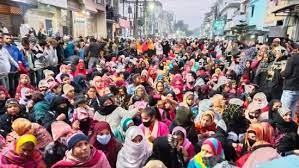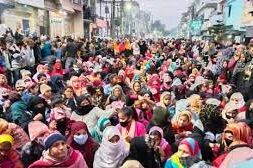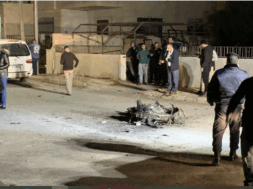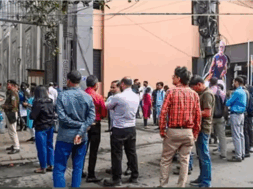
Manas Dasgupta
NEW DELHI, Jan 5: Thousands of people facing the prospects of being rendered homeless forthwith heaved a huge sigh of relief as the Supreme Court on Thursday stayed the Uttarakhand High Court’s order using force to get the people encroaching on the land owned by the Indian Railways evicted within seven days outside the Haldwani railway station in Uttarakhand.
“There cannot be uprooting of 50,000 people overnight… It’s a human issue, some workable solution needs to be found and some rehabilitation scheme is necessary for those claiming legal rights in the land,” the Supreme Court said, as it stopped an Uttarakhand High Court order that had cleared the eviction of the people who live in some 4,000 homes after a case that went on for years.
“The moot point to be considered is whether the complete land is to vest in the railways or whether the state government is claiming a part of the land. Apart from that, there are issues of occupants claiming rights in the land as lessees/auction purchasers. We are on the way the order has been passed as there cannot be uprooting of 50,000 people in 7 days. We do believe that a workable arrangement is necessary to segregate people who may have no rights in the land who will have to be removed, coupled with schemes of rehabilitation which may already exist while recognising the need of the railways,” a bench of Justices Sanjay Kishan Kaul and A S Oka said after hearing petitions challenging the high court order.
Issuing notice to the railways and state of Uttarakhand, the court also directed that there shall be complete restraint on further constructions on the land, whether by existing occupants or by others and sought responses from the railways and the Uttarakhand government. It fixed the next hearing of the case on February 7.
Referring to the suggestion by the high court of using force to evict the people, the Supreme Court said, “It may not be correct to say that paramilitary forces have to be deployed to remove people who have been living there for decades.”
The Bench remarked that some of these people have been living on the land for 50 to 70 years and could not be evicted within a week. The court said the issue has a “human angle.” Many proceedings under the Public Premises Act were instituted ex parte against the families during the COVID-19 pandemic. A balance had to be struck between Railways’ need to develop the land and the families’ right to live with dignity. The rights of the families on the land had to be examined. Even those who have no rights, but have been living there for years, need to be rehabilitated. “They cannot be uprooted overnight from the land… Somebody has to go into the need for rehabilitation while recognising the need of the Railways,” Justice Kaul said. “And it was not right to order bringing in paramilitary forces,” Justice Oka remarked.
Additional Solicitor General Aishwarya Bhati, for the Railways, said the land around the Kathgodam Railway Station could not be developed and there is a need to open the State to more rail traffic, with Haldwani the nearest location. The land belonged to the Indian Railways. Ms. Bhati said the people had never claimed their right to rehabilitation. Instead, they had claimed right over the land itself.
Senior advocates Colin Gonsalves, Siddharth Luthra and Salman Khurshid, and advocate Prashant Bhushan, appearing for the various affected families, said over 5,000 families were affected. Proceedings against them pertaining to the Public Premises Act were still on. The High Court order had come out of the blue and was ex parte. They had not been given a reasonable opportunity to be heard. Children, women and elderly persons among them now faced the prospect of being evicted from their homes in the dead of winter in the biting cold.
Their petition said: “Ours is a welfare state where government authorities need to work towards the well-being and prosperity of the citizens. In the present case, they have proceeded without following due process to issue ex-parte orders against the petitioners and produce arbitrary demarcation report… Such an approach shows an absolute disregard to procedure of law and is in complete violation of basic humanitarian and fundamental rights.”
“These people are not just encroachers… There are multiple issues involved here. They cannot be evicted within the week,” Justice Kaul remarked.
Taking up the case a day after activist-lawyer Prashant Bhushan made a formal request on Wednesday for an urgent hearing on humanitarian grounds, the apex court order has come as a major relief for residents who have been holding candle marches, sit-ins and prayers to stop the eviction.
The area covers a 2-km strip of land near the Haldwani railway station – Gafoor Basti, Dholak Basti and Indira Nagar, in Banbhulpura area. Besides houses – nearly half of the families claim to have a land lease – the area even has four government schools, 11 private schools, a bank, two overhead water tanks, 10 mosques, and four temples, besides shops, built over decades. The matter reached court in 2013 during hearing on a petition which was originally meant for illegal sand mining in a river near the area. The district administration, following the court’s order of December 20 after a long litigation, had issued a notice in the newspapers asking people to take away their belongings by January 9.
Blaming the BJP government for action against an area where most residents happen to be Muslim, activists and politicians had also joined the protests. Senior Congress leader and former chief minister Harish Rawat held an hour-long ‘maun vrat’ (vow of silence) at his home in the state capital Dehradun. “Uttarakhand is a spiritual state,” he said, “If 50,000 people including children, pregnant women, old men and women are forced to vacate their homes and come out on roads, then it would be a very sad sight,” he said.













